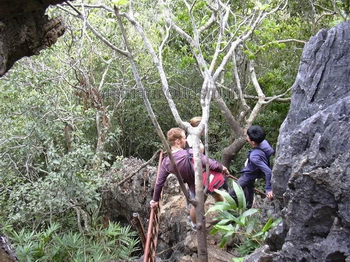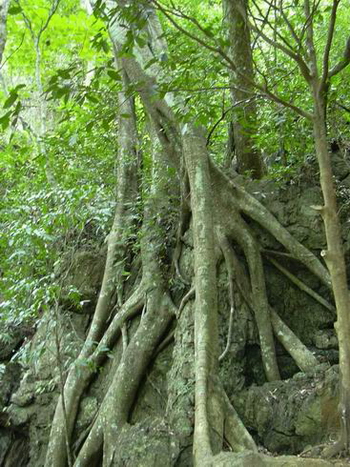Cat
Ba National Park
.JPG)
Alternative site name(s)
None
Province(s)
Hai Phong
Area
15,200 ha
Coordinates
20o44' – 20o51'N, 106o58' – 106o45'E
Distance(s)
From Hai Phong City
From Halong City
From Hanoi
Eco-tours
Trekking, Kayaking… Contact
us for more information
Topography and hydrology
Cat Ba National Park is located in Cat
Hai district, Hai Phong city. The national park is centred
on Cat Ba island, a 28,500 ha island, which lies 20 km due
east of Hai Phong city and immediately to the west of Halong
bay. The national park also incorporates some of the small
islands and marine waters situated to the east of Cat Ba
island.
Like Halong bay, the landscape of Cat Ba National
Park is dominated by karst limestone islands rising
abruptly from the sea. The topography is rugged and marked
by steep outcrops and areas of bare rock. The national park
ranges in elevation from sea level to 331 m at the summit
of Mount Cao Vong.

As is typical in well developed karst landscapes, drainage
patterns are complicated by subterranean passages, which
probably account for most of the drainage in the national
park. The centre of Cat Ba island is no
more than 5 km from the coast, and surface drainage is poorly
developed and seasonal.
Biodiversity values
Cat Ba National Park supports a diversity
of natural habitats, including forested hills, small freshwater
lakes, freshwater swamp forest, mangroves, sandy beaches
and coral reefs. The main natural vegetation type
on Cat Ba island is limestone forest. To date,
839 vascular plant species have been recorded at the national
park, including 25 species listed in the Red Data
Book of Vietnam.
Due to the isolated nature of the island and high levels
of hunting, the diversity and abundance of mammals
at Cat Ba are low compared to other national
parks in Vietnam. Scientists report that the only ungulates
on the island are Southern Serow Naemorhedus sumatraensis,
Eurasian Wild Pig Sus scrofa and Red Muntjac Muntiacus muntjak
but that only the former is common.
Of highest importance from a conservation perspective,
Cat Ba National Park supports the only
known population of Cat Ba Leaf Monkey Trachypithecus poliocephalus
in the world. The results of a detailed survey of this endemic
primate in 1999 and 2000 indicate that the total population
of Cat Ba Leaf Monkey is only between 104 and 135 individuals,
including only 50 to 75 adults.
The limestone habitats at Cat Ba National Park
are important for a number of invertebrate taxa. A survey
in 1998, for instance, revealed that, because of an abundance
of suitable moist niches within the limestone forest, the
national park had a rich and diverse snail fauna.
Other documented values
Each year, Cat Ba island receives large
numbers of domestic and overseas tourists. A significant
proportion of these tourists visit the national park, either
on foot, along one of the hiking trails, or by boat, through
the marine component. The national park can, therefore,
be considered to be making an important contribution to
the island's economy.
|